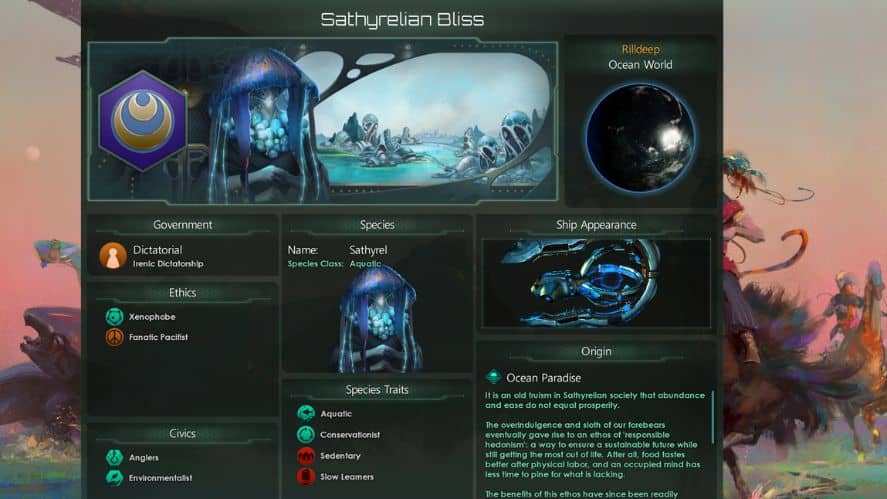When it comes to choosing the best ethics in Stellaris, I could make a case for them all being exceptional. That would be the easy way out, and I am not going to do that.
When it comes to the meta, there are some clear front-runners for which ethics are the best. Ethics are so much more than a few buffs for your empire. They will determine your play style, authority, civics, empire policy, and so much more.
Recommended Read: How to Get Nanites in Stellaris
This guide will explain everything you need to know about ethics. The guide will cover; what ethics are, an overview of every ethic, which ethics are the best, and how they affect gameplay.
In order, the best ethics in Stellaris are Materialist, Militarist, Xenophile, Gestalt Consciousness, Authoritarian, Xenophobe, Egalitarian, Spiritualist, and Pacifist. While some ethics are stronger than others, none of them are weak or unplayable; in this sense, the best ethics are the ones you enjoy playing.
Table of Contents
What are Ethics?
Whether for good or evil, every empire lives and dies by its ethics. Ethics are a collection of principles that determine an empire’s behavior in all situations.
For example, an empire that fears other aliens (xenophobe) is likely to be difficult to get along with. Whilst a pacifist empire is seldom going to declare war on you over border disputes.
In Stellaris, there are eight standard ethics and one special ethic.
The eight standard ethics are: Materialist, Militarist, Xenophile, Authoritarian, Xenophobe, Egalitarian, Spiritualist, and Pacifist. The special ethic is Gestalt Consciousness; this ethic is for Hive Minds and Machine Empires only.

Ethics are selected during empire creation. You have three ethic points to spend, and you must spend all of them.
Ethics come in two intensities; moderate or fanatical. Moderate picks cost one point, and fanatical cost two points. This means every standard empire will have either; three moderate ethics or one fanatical and one moderate.
All the standard ethics come in an opposite pair. When choosing your ethics, you cannot pick traits that oppose each other. The ethic pairs are:
- Pacifist – Militarist
- Xenophobe – Xenophile
- Spiritualist – Materialist
- Authoritarian – Egalitarian
Every ethic will provide an empire with some bonuses that make sense. For example, militarist empires get a bonus to ship fire rate.
If you select a fanatic ethic, the bonuses are multiplied by two. You can change ethics during your play-through, so don’t panic too much if it is your first time.
What Are the Best Ethics in Stellaris
Best is a subjective term. What some consider the best may be different from what others believe, and they would both be correct. With that in mind, when it comes to the topic of meta-picks, the consensus is pretty clear.
The following headings list all the ethics, with the strongest being first.
If your favorite ethic is low on this list, please don’t catastrophize it. Stellaris is a well-balanced game, and I assure you, with minimal practice, every build can be both viable and fun.
Materialist
If your empire is materialist, your people believe that everything that exists, from physical objects to thoughts, is a result of matter interacting with other matter.
Your people are likely atheist and embrace science over deity worship. An example of a materialist society would be the Vulcans from Star Trek.
Materialist empires enjoy some of the greatest bonuses you can get. A ten percent discount on robot upkeep, 20 if you are fanatical.
This is nice to have, but the real strength is the research speed bonus. 5 percent for moderate and 10 for fanatical. This is the enabler for early tech rushes, which can have you leaps and bounds ahead of the competition fast.
When playing as materialists, events and pop-ups will often lead to great research opportunities. The academic privilege living standard can send your research output into the stratosphere.
Its weakness is that getting hold of psionic research options is almost impossible. With that said, all other ascension paths are open to materialists.
Militarist
Militarist empires believe that they should maintain a strong military. Military service garners great respect, and military strength is a sound moral virtue.
Empires with this ethic are often at war with their enemies for all manner of reasons. The human society depicted in Starship Troopers is an example of a militarist society.
A lot of people like to play Stellaris, where being at war is the default state. This ethic is the great enabler of that play style.
Making claims receives a generous 10 or 20 percent discount. And all ships get a 10 or 20 percent bonus to ship fire rate. Pairing this with the supremacy tradition is very strong.
Militarist empires are seldom not at war. They are building vast fleets all the time and looking for their next expansion campaign. You can never accuse a militarist empire of being a boring play style.
Xenophile
Xenophile empires seek to meet any and all alien races they can find. New alien races fascinate them, and because of this, they are well-liked by other space-bourne empires.
The United Federation of Planets from Star Trek is a great example of a xenophile culture.
Empires with this ethic get a lot of boons. Improved trade value, extra leaders, more envoys, and increased opinion with all empires. All these extra bonuses make this ethic a great one for beginners to try out.
Xenophiles will often have multiple alien species living within their empire. Migration treaties, and the forming of federations, is likely to be your primary focus with this ethic.
You can even take steps to begin, ahem, interspecies breeding. This will require you to research the late-game tech called Xeno Compatibility.
Gestalt Consciousness
A Gestalt Consciousness is a concept from science fiction, sometimes called group mind.
Instead of a society of individuals, the society comprises vessels controlled by one consciousness. The Tyranids from Warhammer 40K are a perfect example of a group-mind society.
Not an ethic for beginners, that is for sure. You must play as either a hive mind or machine intelligence authority when you take this ethic.
The strength in these empires is that you no longer have to deal with the happiness of pops. There are also bonuses to war exhaustion, influence, and encryption.
Playing as a Gestalt consciousness changes the core mechanics of the game. Some of the most entertaining and unique ways to play the game involve this ethic.
Driven assimilator, Rogue Servitor, Parasitic Overmind, and Devouring Swarm civics are a great way to mix up your next play-through.
Authoritarian
Authoritarians empires believe that the leaders of society have the right to rule over their people with an iron fist.
Democracy is not a tenant of authoritarians, and they are run by dictators or monarchies. The Goa’uld from the Stargate universe is an authoritarian species.
Authoritarians enjoy a nice bonus to influence, and basic worker production improves by either five or ten percent. With this ethic, you can also make use of slaves, meaning those low-level workers are much easier to control.
When playing with this ethic, you need to learn to dissociate with your own moral code because you are the bad guys.
The decisions the game offers you will revolve around oppressing your pops further and elevating those with power.
Xenophobe
In Stellaris, a xenophobic empire is one which is wary of and often avoids contact with aliens.
In extreme cases, this can lead to active hostility to all other alien races. The Daleks, from the Doctor Who universe, are an example of a violent xenophobic society.
Xenophobes can expand early and fast, with their reduced influence cost to build starbases. Due to their lack of immigration, they also receive a healthy five or ten percent buff to pop growth.
A few morally questionable options also become available to you as a xenophobe. You can enslave other alien races and have them become livestock for your pops to eat.
Playing as a xenophobe, means you intend to keep yourself private or invade anything that isn’t your own species. Other empires get a negative opinion modifier of you.
You will have to learn to be very self-reliant as a xenophobe. After all, no one likes hanging out with racists.
Egalitarian
Egalitarian empires believe that all people within a society are equal; as a result, their citizens enjoy equal rights and opportunities.
These empires are likely to be democratic in nature while shunning monarchies and dictatorships. The Culture, from Ian M Banks’s novel series, is a hyper-advanced egalitarian empire.
Factions that form in an egalitarian empire produce a great deal more unity.
Pops with the specialist designation have their output increased by either five or ten percent. Pops in these empires are much more likely to be happy, leading to further production benefits.
The egalitarian ethic is one of the least invasive ethics you can pick in terms of gameplay. It will not interfere with the game mechanics in any radical way.
While I would not consider it an easy mode, it is a much more relaxed style of game as an egalitarian.
Spiritualist
Spiritualist empires may or may not believe in any god. Instead, they believe that life and its gifts stem from a place beyond what science can explain.
Whether that means the society believes in a god is a decision left up to the player to decide. The Namekians, from the Dragonball Z manga series, are a spiritualist alien race.
Unity production is a spiritualist’s greatest strength. Not only do they receive a ten or twenty percent bonus to their production, but they also have access to the temple building, which produces a lot of unity on its own. Edicts also become cheaper to enact and maintain.

Psionics are my favorite part of playing as a spiritualist empire. The psionic ascension path has some interesting story paths available, which no other path can provide.
I don’t want to spoil it for you, so you will have to discover them in the shroud for yourself.
Pacifist
Pacifist empires loathe war and will do all they can to garner a peaceful solution. They are still allowed to field strong militaries, but the prime purpose of their military is for defense. In science fiction, the Jedi from Star Wars are an example of a pacifist people.
Pacifists, of course, cannot directly engage in open hostility with other empires. They do enjoy increased stability across their worlds and either a 15 or 30 percent reduction in empire size from pops.
The reason this is at the bottom is not because it is weak, but the play style it shoehorns you into. You will end up playing tall at some point during your play-through.
When you have expanded as far as you can, you cannot start invading your neighbors for new systems. If playing tall is your favorite way to play, you should highly consider taking some form of pacifist.
Selecting your ethics is about so much more than what is the most powerful.
My two favorites are spiritualist and pacifist. I rank them at the bottom of the power tier list, but I still love them. I don’t like them because they make the game harder, but because I enjoy the gameplay, these ethics provide.
If you are struggling to complete your games and need a stronger build, I encourage you to check out my beginner build guide. It will explain everything you need to know about the best ethics I picked for it.
This is everything you need to know about the best ethics in Stellaris.
If you have any questions or suggestions for this guide, please let us know in the comments section below.
As always, have fun picking the perfect ethics for your next empire.




